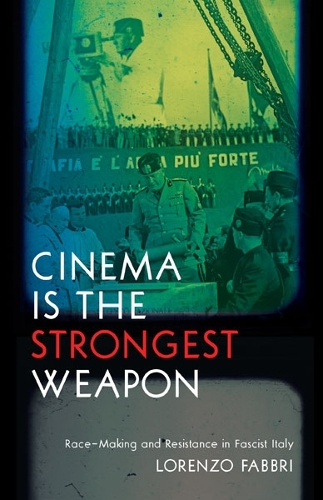
Cinema is the Strongest Weapon: Race-Making and Resistance in Fascist Italy
(Paperback)
Available Formats
Publishing Details
Cinema is the Strongest Weapon: Race-Making and Resistance in Fascist Italy
By (Author) Lorenzo Fabbri
University of Minnesota Press
University of Minnesota Press
27th March 2024
United States
Classifications
General
Non Fiction
Social discrimination and social justice
Ethnic groups and multicultural studies
Political structures / systems: autocracy, totalitarianism and dictatorship
791.43094509041
Physical Properties
Paperback
320
Width 140mm, Height 216mm, Spine 18mm
397g
Description
A deep dive into Italian cinema under Mussolinis regime and the filmmakers for whom it was a means of antifascist resistance
Looking at Italys national film industry under the rule of Benito Mussolini and in the era that followed, Cinema Is the Strongest Weapon examines how cinema was harnessed as a political tool by both the reigning fascist regime and those who sought to resist it. Covering a range of canonical works alongside many of their neglected contemporaries, this book explores films mutable relationship to the apparatuses of state power and racial capitalism.
Exploiting realisms aesthetic experiential and affective affordances, Mussolinis biopolitical project employed cinema to advance an idealized vision of life under fascism and cultivate the basis for a homogenous racial identity. In this book, Lorenzo Fabbri crucially underscores realisms susceptibility to manipulation from diametrically opposed political perspectives, highlighting the queer, Communist, Jewish, and feminist filmmakers who subverted Mussolinis notion that cinema is the regimes strongest weapon by developing film narratives and film forms that challenged the prevailing ethno-nationalist ideology.
Focusing on an understudied era of film history and Italian cultural production, Fabbri issues an important recontextualization of Italys celebrated neorealist movement and the structural ties it shares with its predecessor. Drawing incisive parallels to contemporary debates around race, whiteness, authoritarianism, and politics at large, he presents an urgent examination into the broader impact of visual media on culture and society.
Author Bio
Lorenzo Fabbri is associate professor of French and Italian at the University of Minnesota.
